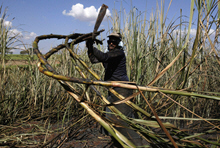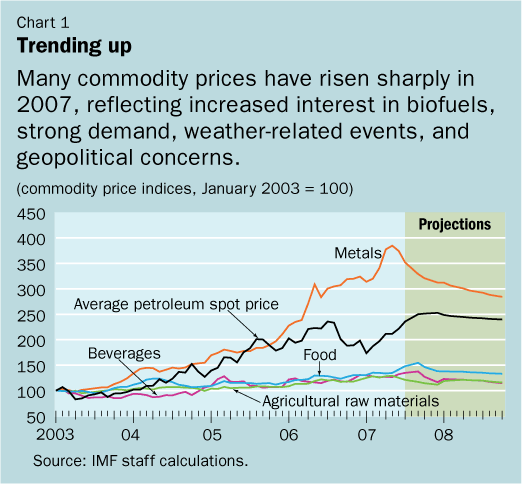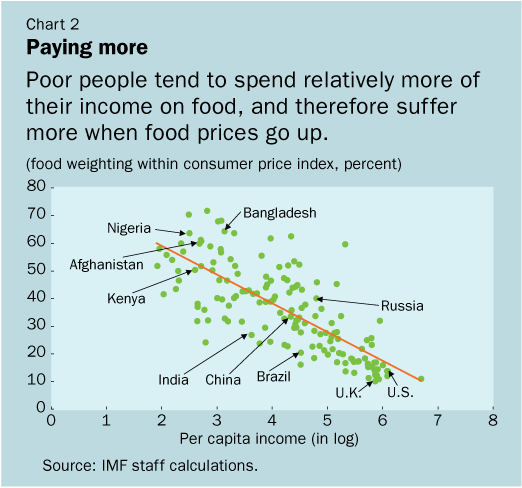
Typical street scene in Santa Ana, El Salvador. (Photo: iStock)
IMF Survey: Biofuel Demand Pushes Up Food Prices
October 17, 2007
- Boom in energy, metals prices spreads to food, partly reflecting biofuel demand
- Food price hikes push up inflation, particularly in developing countries
- Realizing potential benefits of biofuels requires better policies
Despite the recent financial turmoil that has dampened the global growth outlook, many commodity prices have risen sharply during 2007 (see Chart 1).

Sugarcane harvest in Pradopolis, Brazil: ethanol derived from Brazilian cane costs less than corn-based U.S. ethanol (photo: Rickey Rogers/Reuters)
COMMODITY PRICES
Oil prices hit record highs during September and October, reflecting solid demand growth in the face of sluggish supply and ongoing geopolitical concerns.

Futures markets indicate that high prices are likely to continue over the medium term, providing incentives for a surge in biofuel production as a supplement to transportation fuels. This, together with droughts and animal diseases, has pushed up food prices and inflation across the globe.
The October 2007 World Economic Outlook (WEO) has analyzed these developments in detail, seeking to determine:
• the causes of higher food prices
• the effects on global inflation
• whether the surge in biofuels production will be beneficial
The rise in food prices reflects a combination of factors. Higher biofuel demand in the United States and the European Union (EU) has not only led to higher corn and soybean prices, it has also resulted in price increases on substitution crops and increased the cost of livestock feed by providing incentives to switch away from other crops.
Poor harvests in many countries and outbreaks of animal diseases (for example in China) have led to further price hikes. Adding to these pressures on commodity prices is increased demand from emerging markets, particularly China and India.
Inflation edging up
Higher international food prices have put upward pressure on inflation, both directly and through their impact on nonfood prices. The direct first round contribution of food to inflation for the world as a whole has risen from about one-fourth in 2000-06 to more than one-third in the first four months of 2007, with the impact being higher for poorer countries (see Chart 2).

The IMF's analysis finds that food prices have had a discernible impact on non-food price inflation in many emerging and low-income countries.
Dilemma of biofuels
Using biofuels to supplement transportation fuels at modest blends—under current technology—has its pros and cons. Biofuels can supplement traditional fuels while contributing to rural development. However, until new technologies are developed, using food to produce biofuels might further strain already tight supplies of arable land and water all over the world, thereby pushing food prices up even further.
Realizing the potential benefits of biofuels requires better policies. Brazilian ethanol derived from sugarcane, for example, is less costly to produce than corn-based ethanol in the United States, and also yields greater environmental benefits. However, generous tax credits for blenders, tariffs on imported biofuels, and agricultural support for grain farmers in the United States and the EU make it difficult for low-cost foreign biofuel producers to compete in these markets.
If tariffs and subsidies in the United States and EU were eliminated, biofuels would likely be produced largely by lower-cost producers such as Brazil and other Latin American countries. Similarly, under such a scenario, biodiesel would be produced mostly by Malaysia, Indonesia, India, and some African countries.
In sum, while we wait for more efficient fuel technologies to emerge, the first-best policy would be to allow free trade in biofuels. This would benefit the environment as well as make biofuel economically more viable.







